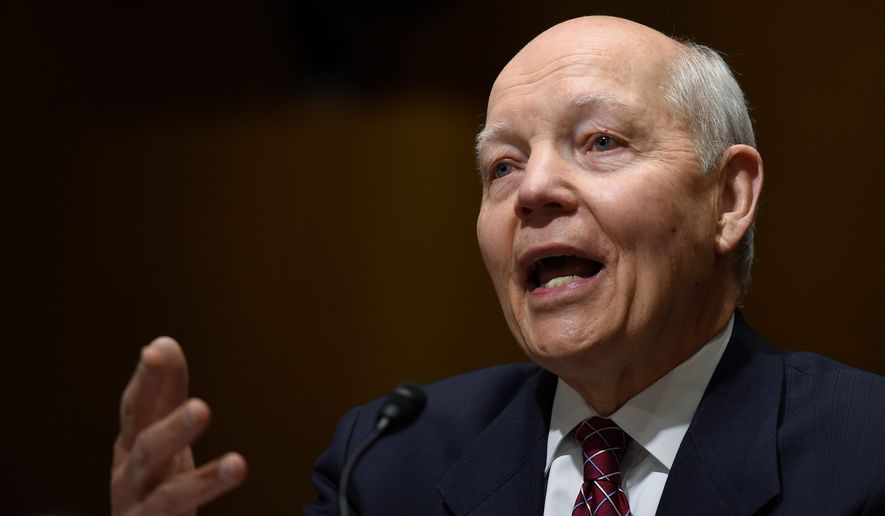IRS Commissioner John Koskinen said Tuesday the embattled agency’s troubles are a thing of the past, insisting the tax collectors have halted extravagant conferences, no longer pay bonuses to employees who cheat on their taxes, and no longer target nonprofit groups for intrusive scrutiny.
Mr. Koskinen said his agency has also shed many of the leaders who were around for the troubled times, saying that nearly 50 percent of leadership has left in the last five years — which he said is a sign of the new IRS, but also troubling since it deprives taxpayers of needed knowledge and expertise.
But he acknowledged other problems building up at the agency, including taxpayers showing up hours before offices open in order to ensure they can get help on filling out their tax forms, and short staffing causing them to ignore more than 60 percent of the phone calls coming into the agency this year.
“The criticisms of these areas is absolutely deserved, but what gets lost is that these mistakes occurred several years ago, and we have taken concrete steps to address them,” said Mr. Koskinen. “It’s not the IRS of 2010, 2011 or even 2012.”
He said he personally has to approve expensive conferences now, which has cut down on those costs by 80 percent since 2010, when internal audits found lavish spending and wasteful projects totaling tens of millions of dollars.
And Mr. Koskinen said he’s halted bonuses to tax cheat employees, and is taking steps to try to make sure former IRS employees who cheat on their taxes or who had performance problems aren’t rehired back by the agency — something an internal audit earlier this year reported has happened regularly.
SEE ALSO: Obama supports reduction in military retirement pay
The commissioner also said the first year of Obamacare tax filings “has gone smoothly,” which he said would have surprised a number of folks based on the botched rollout of the Obamacare website a year ago.
“The system has worked flawlessly,” he said, adding that for 77 percent of taxpayers their obligation is simply checking the box that affirms they have coverage, while the rest are navigating between paying the tax penalty or claiming an exemption from the law.
Mr. Koskinen’s claims of improvement clash with the sense of Congress, where Republican lawmakers in March warned him there are still a host of problems needing attention and said he should plan to do more with less resources, rather than expecting the massive injection of billions of dollars of cash he requested.
“We deliberately lowered the IRS funding to a level that will make the IRS think twice about what you are doing and why you are doing it because you don’t have a single dime to spare on anything frivolous or foolhardy or even mediocre,” Rep. Ander Crenshaw, the Florida Republican who heads the House spending subcommittee that oversees the IRS, told Mr. Koskinen, who was on Capitol Hill to defend his budget.
Mr. Crenshaw said the IRS should focus on its core mission of collecting taxes and helping taxpayers, and Republicans said that shouldn’t include targeting tea party groups, or trying to rewrite rules that would crack down on nonprofits’ activities in the future.
Mr. Koskinen said the inspector general who investigated the tea party targeting blamed, in part, confusing rules, and the commissioner said rewriting those rules is an important step to preventing anything from happening again.
SEE ALSO: Hillary Clinton takes hit in poll; voters don’t trust her
Asked specifically about a potential repeat of tea party targeting, Mr. Koskinen said he is convinced his employees will head off any future efforts to target groups. But despite his assurances, the scrutiny of some groups continues, with some of them still waiting for approval years after they first applied.
Mr. Koskinen also said that despite the budget cuts, he doesn’t believe it’s easier to get away with cheating on taxes. He said even in the fat budget years, the agency would audit as low as 1 percent of the population, but he said computers now pick over tax returns to try to spot trouble signs, and he said the agency will spot cheats.
“If you’re trying to be compliant, even if you have trouble paying, we’ll work with you. We’re anxious to help taxpayers,” he said. “If you’re actually trying to dodge your obligation to pay your taxes, we’ll find you and we won’t be very happy about that.”
• Stephen Dinan can be reached at sdinan@washingtontimes.com.




Please read our comment policy before commenting.